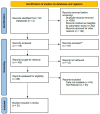Review on Perioperative and Oncological Outcomes of Robotic Gastrectomy for Cancer
- PMID: 34357105
- PMCID: PMC8306865
- DOI: 10.3390/jpm11070638
Review on Perioperative and Oncological Outcomes of Robotic Gastrectomy for Cancer
Abstract
Background: Minimally invasive gastrectomy is currently considered a valid option to treat gastric cancer and is gaining increasing acceptance. Recent reports have suggested that the application of robots may confer some advantages over conventional laparoscopy, but the role of robotic surgery in clinical practice is still uncertain. We aimed to critically review the relevant evidence comparing robotic to standard laparoscopic surgery in performing radical gastrectomy.
Methods: The Pubmed/Medline electronic databases were searched through February 2021. Paper conference and the English language was the only restriction applied to our search strategy.
Results: According to the existing data, robotic gastrectomy seems to provide some benefits in terms of blood loss, rate of conversion, procedure-specific postoperative morbidity, and length of hospital stay. Robotic gastrectomy is also associated with a longer duration of surgery and a higher economic burden as compared to its laparoscopic counterpart. No significant differences have been disclosed in terms of long-term survivals, while the number of lymph nodes retrieved with robotic gastrectomy is generally higher than that of laparoscopy.
Conclusions: The current literature suggests that robotic radical gastrectomy appears as competent as the conventional laparoscopic procedure and may provide some clinical advantages. However, due to the relative paucity of high-level evidence, it is not possible to draw definitive conclusions.
Keywords: gastric cancer; laparoscopic gastrectomy; minimally invasive gastrectomy; robotic gastrectomy.
Conflict of interest statement
The authors declare that they have no conflict of interest in the present manuscript. No grant or other sources of funding have been received for the drawing up of this manuscript, which is not submitted or under consideration elsewhere.
Figures
Similar articles
-
[Application of robotic and laparoscopic radical total gastrectomy to gastric cancer patients with body mass index ≥24 kg/m2].Zhonghua Wei Chang Wai Ke Za Zhi. 2018 Mar 25;21(3):318-324. Zhonghua Wei Chang Wai Ke Za Zhi. 2018. PMID: 29577221 Chinese.
-
Robotic-assisted minimally invasive surgery for gynecologic and urologic oncology: an evidence-based analysis.Ont Health Technol Assess Ser. 2010;10(27):1-118. Epub 2010 Dec 1. Ont Health Technol Assess Ser. 2010. PMID: 23074405 Free PMC article.
-
Robotic versus laparoscopic gastrectomy for gastric cancer: The largest meta-analysis.Int J Surg. 2020 Oct;82:210-228. doi: 10.1016/j.ijsu.2020.07.053. Epub 2020 Aug 12. Int J Surg. 2020. PMID: 32800976 Review.
-
Lower rate of conversion using robotic-assisted surgery compared to laparoscopy in completion total gastrectomy for remnant gastric cancer.Surg Endosc. 2020 Feb;34(2):847-852. doi: 10.1007/s00464-019-06838-3. Epub 2019 May 28. Surg Endosc. 2020. PMID: 31139994
-
Advances in Laparoscopic and Robotic Gastrectomy for Gastric Cancer.Pathol Oncol Res. 2017 Jan;23(1):13-17. doi: 10.1007/s12253-016-0131-0. Epub 2016 Oct 17. Pathol Oncol Res. 2017. PMID: 27747472 Review.
Cited by
-
Diagnosis to dissection: AI's role in early detection and surgical intervention for gastric cancer.J Robot Surg. 2024 Jun 20;18(1):259. doi: 10.1007/s11701-024-02005-6. J Robot Surg. 2024. PMID: 38900376 Review.
-
Benefits of minimally invasive surgery in the treatment of gastric cancer.World J Gastroenterol. 2022 Aug 14;28(30):4227-4230. doi: 10.3748/wjg.v28.i30.4227. World J Gastroenterol. 2022. PMID: 36157117 Free PMC article.
-
Robotic-Assisted Total Gastrectomy for Gastric Cancer After Coronary Artery Bypass Grafting Using the Right Gastroepiploic Artery: A Case Report.Cureus. 2024 Aug 21;16(8):e67446. doi: 10.7759/cureus.67446. eCollection 2024 Aug. Cureus. 2024. PMID: 39314567 Free PMC article.
-
Robotic versus Laparoscopic Gastrectomy for Gastric Cancer: An Updated Systematic Review.Medicina (Kaunas). 2022 Jun 20;58(6):834. doi: 10.3390/medicina58060834. Medicina (Kaunas). 2022. PMID: 35744096 Free PMC article.
References
-
- Kim H.H., Han S.U., Kim M.C., Kim W., Lee H.J., Ryu S.W., Cho G.S., Kim C.Y., Yang H.-K., Park D.J., et al. Effect of laparoscopic distal gastrectomy vs open distal gastrectomy on long-term surviv-al among patients with stage I gastric cancer: The KLASS-01 randomized clinical trial. JAMA Oncol. 2019;5:506–513. doi: 10.1001/jamaoncol.2018.6727. - DOI - PMC - PubMed
-
- Liu F., Huang C., Xu Z., Su X., Zhao G., Ye J., Du X., Huang H., Hu J., Li G., et al. Chinese Laparoscopic Gastrointestinal Surgery Study (CLASS) Group. Morbidity and Mortality of Laparoscopic vs Open Total Gastrectomy for Clinical Stage I Gastric Cancer: The CLASS02 Multicenter Randomized Clinical Trial. JAMA Oncol. 2020;6:1590–1597. doi: 10.1001/jamaoncol.2020.3152. - DOI - PMC - PubMed
-
- Bracale U., Merola G., Pignata G., Andreuccetti J., Dolce P., Boni L., Cassinotti E., Olmi S., Uccelli M., Gualtierotti M., et al. Laparoscopic gastrectomy for stage II and III advanced gastric cancer: Long-term follow-up data from a Western multicenter retrospective study. Surg. Endosc. 2021:1–12. doi: 10.1007/s00464-021-08505-y. - DOI - PMC - PubMed
-
- Bolger J.C., Al Azzawi M., Whooley J., Bolger E.M., Trench L., Allen J., Kelly M.E., Brosnan C., Arumugasamy M., Robb W.B. Surgery by a minimally invasive approach is associated with improved textbook outcomes in oesophageal and gastric cancer. Eur. J. Surg. Oncol. 2021;17 doi: 10.1016/j.ejso.2021.03.240. - DOI - PubMed
Publication types
LinkOut - more resources
Full Text Sources


